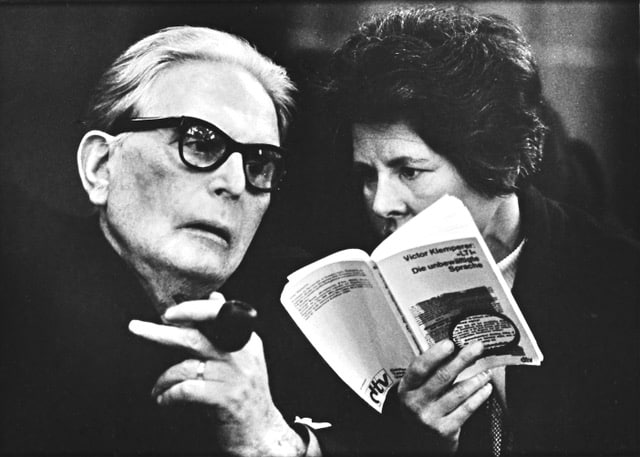Secrets of Otto Klemperer and his daughter, Lotte
UncategorizedFrom my monthly essay in The Critic:
…Klemperer died 50 years ago this July, aged 88, cared for by his daughter Lotte at their Swiss home. Lotte, a captivating character in her own right, died there 20 years ago this month. A Warner Classics box of Klemperer orchestral recordings has been issued on 95 CDs. It is by no means comprehensive. A further box of opera and oratorio discs, including the electrifying Covent Garden Fidelio, will follow in October.
From the mid-1950s to the end of the 1960s, Klemperer was among the most prolific conductors on record. Yet around 1950 everyone thought he was finished. His story, thanks to Lotte, is one of the most remarkable music resurrections….
Read on here.






How odd. No mentioned was made of Otto Klemperer’s devoted son Werner, a classically trained violinist and concert performer but perhaps better known as the two-time Emmy Award winner for his portrayal of Colonel Klink, the POW camp commandant, on the hit TV series “Hogan’s Heroes”.
I read an interview with Werner Klemperer where the interviewer asked him what his dad had thought of Hogan’s Heroes. Werner said, “My father said to me, ‘Son, your work is strong and your timing is excellent. But who writes such material?’
Werner Klemperer appeared with the Milwaukee Symphony under Zdenek Mácal , doing the narration to Berlioz’s “Lelio” which is in essence the “rest of the story” to the Symphonie fantastique on a night when the MSO did both pieces. Very effective and wry. Both works were recorded for Koss Classics.
I worked with Werner Klemperer once when he recorded the narration for a children’s piece (Gail Kubik’s “Gerald McBoing Boing”), and he was a fun and engaging colleague. The outtakes — of which I still have a tape — were definitely •not• for kids; he cursed like a sailor when he made an error!
In the photo Lotte holds LTI, Lingua Tertii Imperium, by Otto’s cousin, Victor, which I read recently in its English translation. It’s an excellent account of propaganda and the degradation on the German language under the Nazis. Worth reading and relevant today.
Hi Tom. Good eyes. Victor’s autobiography is excellent (it was a best seller in Germany). He mentions his famous uncle a couple of times.
And usually accompanied by a negative crack or two … I don’t think the various members of the Klemperer family got along all that well.
And in his later diaries, covering his time living in East Germany during the years 1945-1959, he’s dismayed to encounter similar German language propaganda schemes on the part of the DDR government. Different regime, same approach …
I know nothing about his daughter but many of his recordings are still go to recordings. He was amazing.
What a life of challenges and triumphs. His German Requiem and others are still so captivating.
Thank you for a lively and fitting memorial piece. Just two factual errors (but where did you get that anecdote about Alma Mahler…?):
1. Klemperer set his bedding on fire (in September 1958) not by “dousing a cigarette in a bedside whisky glass”, as you write, but by knocking out embers from a smouldering pipe. Lotte Klemperer recalls (in her diary) that he attempted to douse the fire with water from a glass on his bedside table, but that it actually contained surgical spirits. The resulting conflagration caused very serious burns (cf. my German-language edition of Klemperer’s selected letters, “Verzeiht, ich kann nicht hohe Worte machen”, Munich 2021, p. 418).
2. It’s true that Klemperer avoided, indeed disliked, Mahler’s 1st, 3rd, 5th and 6th symphonies, which is why he never recorded them. He did conduct the Adagio and Purgatorio from the 10th symphony a couple of times, but later regretted having done so. Towards the end of his career, however, he was actively negotiating with EMI to record Mahler’s 8th Symphony, but Lotte vetoed the project out of hand. “The strain would have killed him”, she explained. Hence, we can safely ssume that he fully approved of the 8th, even if he never performed or recorded it (what a loss!).
Anna Mahler told me herself.
You didn’t respond to what seems to many of us to be an incorrect account of Klemperer’s fire incident. I’m curious to know your source, which seems at odds with other accounts, including Lotte Klemperer and Peter Hayworth’s.
Dear Norman,
Your article honoring Klemp was genuinely touching. His comment to Barenboim about belief is more true now than ever before (or perhaps it’s always been true and we’ve just forgotten). We as human beings need belief, not to understand the great mysteries of life, but to commune with them.
I will never forget hearing a recording of his live performance of Schönberg Verklärte Nacht with the Concertgebouw Orchestra from ’55. It was during my conducting studies and it stuck me like a bolt of lightning , changing my understanding of the piece literally overnight. It was so daring, bold, messy, extreme and direct. It was, in a word, intoxicating.
Long live the Kl-emperor!
Very nice to have his recordings re-released. Well, maybe not that dreadful Mahler 7th. But now can someone please reprint Heyworth’s multi-volume biography?
What are the sales figures for a box of 95 CDs?
If you followed such things, you would know that there are MANY such boxed cd sets these days…it’s been all the rage for a while now. I’m sure some of them sell better than others, but I suspect this will sell rather well. The general thinking seems to be that single issues don’t sell all that well, but larger collections get many of us to buy it all again…especially when many of Klemperer’s EMI recordings were in need of better analog to digital transfers.
God, what a god he was.
My favorite Klemperer story: while rehearsing the Brahms Requiem, Klemperer and Fischer-Dieskau (who disliked each other) disagreed over tempo. “Maestro,” said F-D, “last night Brahms came to me in a dream and said my tempo is the right one.” To which Klemperer replied, “Herr Fischer” (a moniker F-D hated) “Brahms also appeared to me in a dream and told me he doesn’t know you.”
I heard another one about the two of them. Klemperer disapproved (rightly, I think, in most cases) of musicians who, while expert in their chosen area of performance, decided to take up conducting. Fischer-Dieskau made such an attempt (not a very successful one). One day Fischer-Dieskau met Klemperer on the street. “Dr. Klemperer,” asked F-D, “are you perhaps free next Saturday evening? I’m conducting Schumann’s ‘Rhenish’ symphony, and I’d be pleased if you’d come.” Klemperer growled, “Let me see,” and pulled out his datebook, which he seemingly consulted. “I can’t make it,” he finally said. “I’m singing ‘Winterreise’ that night.”
It was Karajan, not Klemps
Ah — thanks for the clarification!
Normy, no, it was indeed Klemps, in the tiny elevator at Royal Festival Hall.
In fact he said, “I’m going to hear Solti sing ‘Winterreise’ tonight.”
Looks like I’m not the only one who needs edification (note second paragraph)…
https://www.theguardian.com/music/2003/feb/04/classicalmusicandopera.artsfeatures
I’d love to know whether I’ve got the story correct: can anyone confirm or revise?
A young conductor was rehearsing the Philharmonia in Beethoven 5; a member of the orchestra was asked what he thought of the rehearsal and replied “When you’ve done Beethoven 5 with Otto Klemperer, there’s not a lot a newcomer can teach you.”
Klemp was the second personality to guide me to appreciate classical music in the 1950s, when all I knew was the top 20 in the Melodymaker. The other was Guido Cantelli. I read in the paper about his upcoming concert at the Festival Hall, it was so interesting that I had to and hear it. My first classical concert ever. Klemp was getting close to the end of his career, but he still had a great finale with the Philharmonia. Cantelli was at the start of his when he died so early.
Great full essay, Norman. Lots of unusual stuff in there. And I’m not fawning.
I think there is some missing context to the “Lotte, ein Schwindel” story. Many years ago I had a book by Neville Cardus called Full Score which had a chapter on Klemperer. Cardus explained that Klemperer was told by a record producer that a fluff in a take could easily be replaced by taking that note from another take, and this was his response. As this is such a well known aspect of recording technique, it seems naive for Klemperer to claim he was ignorant of it so was it just mock outrage?
Hi, I am an audio-engineering nerd. The story I heard long ago was that the production team decided it was best not to mention to Klemperer that they had changed over from cutting acetates for making 78rpm discs, to recording on tape to make LPs.
My guess is that this was in Vienna in 1951, where Klemperer recorded nine projects for Vox records, including Missa Solemnis. The first commercial professional tape recorders were available in 1948, so 1951 was still during the changeover, especially outside of Los Angeles, New York, and London.
So, they recorded the first movement or segment, and there was a problem early on. They then asked for another take. But once they got past the editing point, the producer waved off the orchestra, and Klemperer was outraged.
So they took him into the recording shack and showed him the tape machines. Klemperer immediately grasped the artistic implications of being able to splice in a partial take to fix an error in a complete take, to avoid having to re-do an entire movement. Hence, the “Swindle” remark.
Which always reminds me of the famous Ruggierio Ricci story. A former student sent his newly-released recording to Ricci, and later phoned, asking Ricci’s opinion.
Ricci supposedly said, “It was wonderful. Don’t you wish you could play that way?”
john
I didn’t know any of that stuff about Klemperer and the ladies. Perhaps Dutoit and Domingo were standing around, taking notes…
https://www.youtube.com/watch?v=D8MXauHStWc
Barenboim wrote that Klemp said to him
According to Barenboim he went to visit Klemps at his suite at the Hyde Park Hotel late one evening (he lived there) and found Klemps very disconsolate. Klemps explained that he’d just watched Stokowski doing Beethoven 9 on TV (this would be around 1970). Barenboim asked “was it bad?” Klemps replied – “no, it vas GOOD!”
Klemperer had good things to say about Stokowski, even though he didn’t personally care for the Bach orchestrations. (“…everything he conducts sounds well … The Philadelphia Orchestra under Stokowski was really a giant.”)
Mention is made of OK’s brief stay in a mental asylum. That place was in Rye, N.Y. Long ago torn down, the site is now the athletic fields of the Rye Country Day School which I attended. OK’s history with the place was not lost on me even back then while playing soccer there.
The Rye railroad station is easy walking distance from the school offering direct service to New York about a 30 minutes ride. Klemperer escaped to the train station and went to New York City.